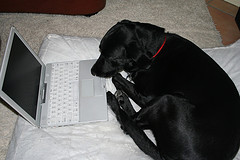On the Internet, Everyone Knows You’re a Dog
 In 1993, the New Yorker famously published a cartoon captioned “On the Internet, nobody knows you’re a dog.” The internet was where you lived your anonymous second life. How times have changed.
In 1993, the New Yorker famously published a cartoon captioned “On the Internet, nobody knows you’re a dog.” The internet was where you lived your anonymous second life. How times have changed.
The excellent Doc Searls mocked the way sites treat your privacy by imagining it in the real world:
“The [privacy] policy tells you that, if you fill out this guy’s form, he will plant on your person a tracking device that will report your movements back to him. Collected data might include the type of car you drive, the routes you take, the names and addresses of the places you visit, and the times and dates for all this activity …At the bottom of the form, under a heading titled “Your Consent”, it says “In dealing with me, you consent to the terms of my Privacy Policy, my Terms and Conditions, and my processing of Personal Information for the purposes given above. If you do not agree to this Privacy Policy, please stop talking to me. If you continue talking to me, I reserve the right, at my discretion, to change, modify, add, or remove portions from this Privacy Policy at any time. Your continued conversation with me, after I put a new form like this in my back pocket, means means you accept these changes”.
“This is your ‘Privacy Policy’”? you say.
“Yes”.
“And your ‘Terms and Conditions’ are something else? ” …
And then Facebook CEO Mark Zuckerberg announced that they were changing their privacy policies since privacy was “no longer a social norm.”
Naturally, there’s a lot of discomfort here. I keep flashing back to blockbuster movies with Will Smith and Shia Labeouf where the big bad military types get control of all of our information and use it to tyrannize the innocent. I understand the fear. But ultimately I think Zuckerberg’s point is very relevant and mostly good.
I’m reminded of the scene in Dharma & Greg where Larry is horrified that Dharma got a Social Security card. “Now you’re on the grid!” he says ominously.
I think this is progress. A generation ago people chose untraceable usernames and lived a second life online. Today we use our real names as Twitter handles and Facebook Connect into social applications. Our online presence is part of our total presence. Online man is born anonymous but surrenders his anonymity to society so that we can interact responsibly and with accountability as our true selves. We shed some of the lies and barriers and interact with greater openness than in the past.
This isn’t just an online thing. My parents and grandparents had many family secrets. Intimacies, squabbles, diseases, and struggles were covered up lest family members be shunned from future work or social relationships. People changed their names to hide their religious and ethnic identities.
People today are generally far more open and less prejudiced than they were years ago. As a result there are far fewer people living in their various closets. Billy Joel’s The Stranger keeps declining in relevance. We come closer to interacting publicly as our true selves.
This is not to argue the important details of privacy policies. But the general social shift that Zuckerberg notes is IMO a generally wonderful thing. May we continue to increase society’s openness online & off, and may it be a reflection of increased appreciation and respect for authenticity, individuality, and responsibility.
What do you think?
Image courtesy of http://www.flickr.com/photos/cogdog/ / CC BY 2.0
January 17, 2010 @ 2:07 pm
I feel a lot of early adopter will share less of personal detail on facebook . If facebook had created the privacy policy initialy and not kept changing it would have more early adopters trusting the future polices of facebook. But from Mark Zuckerbergs continued privacy fisaco and the subsequent protest by the networks users ,has a lot of users skeptical.
If privacy is dead then the only ones to gain are the 419s and their ilk…
there are other issues which crop up but those will be left to a private conversation 😉 .
Privacy can only be truly be dead if this is mirrored IRL . Or if Mark Zuckerbergs was suggesting that the real world has changed how they share information and he is just mirroring it on his network .
Just my 2 cents
Cheers
Crystall Ball Panel: What’s Next in Search | Managing Greatness
April 9, 2010 @ 6:38 am
[…] there’s a generational thing here. [I side with the people younger than me, as I wrote in on the internet everybody knows you're a dog. Gillian says that 1984 is coming it was just off by a few years, and we need the government to […]